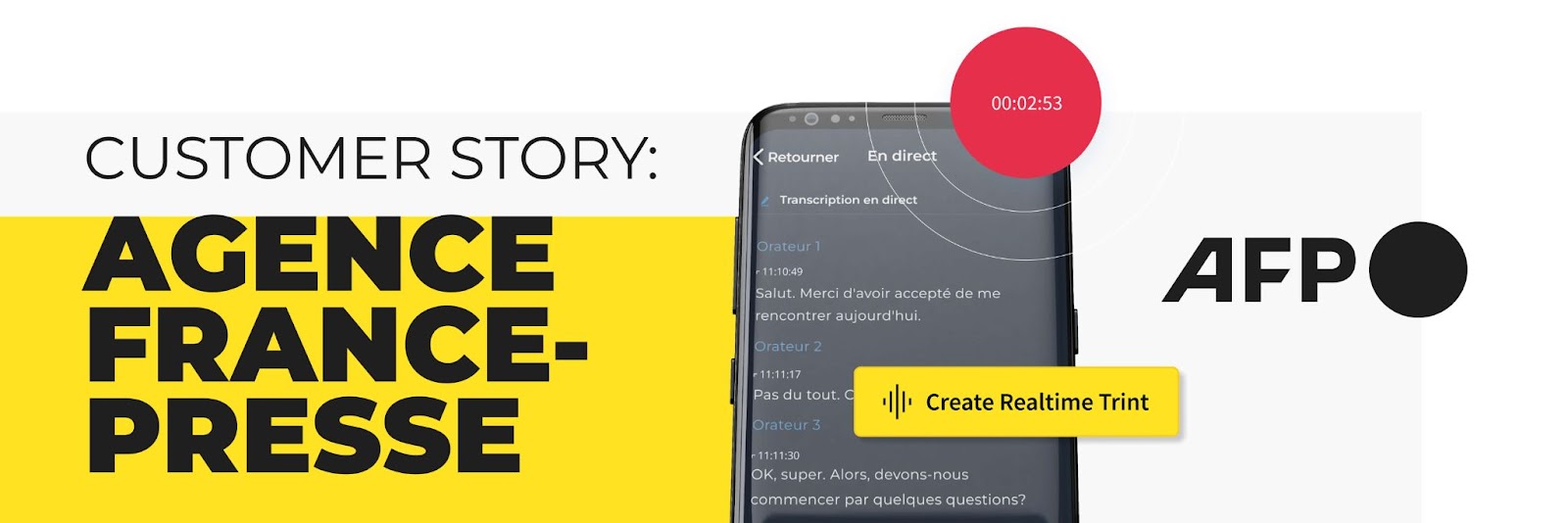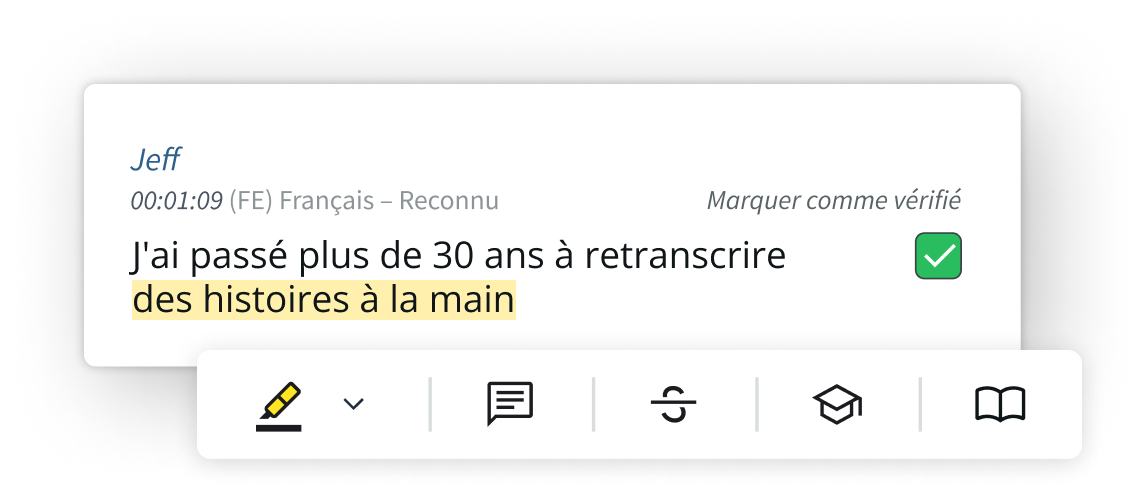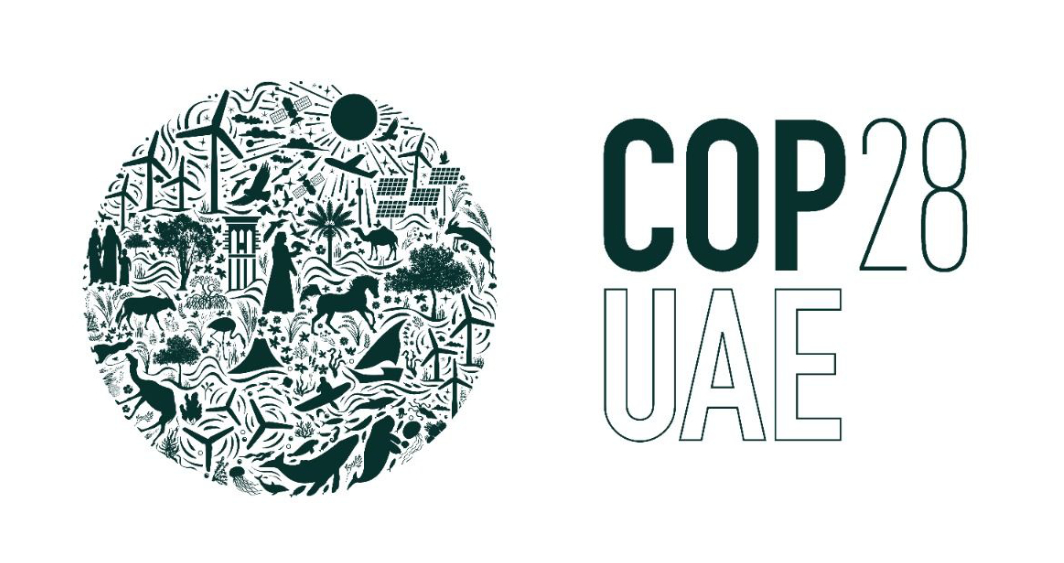
“French politics requires great responsiveness on a daily basis. With Trint's live features, we can work in real-time and easily share transcriptions within the newsroom.”
Edouard Guihaire, Deputy Technical Editor-in-Chief at Agence France-Presse (AFP), is talking about the changes his newsroom has seen since integrating Trint into their workflow in January 2024.
Like any global news agency, breaking stories before the competition requires AFP to be both accurate with their reporting and fast to make sure no-one gets there first. By using tools like Trint Live, Guihaire and his colleagues are able to react to the news cycle in the moment – giving them an edge that can make all the difference in the modern world of journalism.
“Getting good transcription for live events is something that we need to be really efficient at as a news agency, which means finding a tool that helps us with both speed and accuracy,” says Guihaire.
“For our journalists, Trint is a great tool to deal with breaking news and help avoid that intense pressure of typing and transcribing.”
Founded in 1835 under the name Agence Havas, AFP holds claim to being the world's oldest news agency, with its main headquarters still residing in Paris, France. The organization now boasts an impressive news network across 150 countries, with 2,600 staff representing 100 different nationalities and multimedia content shared globally in six languages.
“We have offices everywhere in the world and deal with many languages, which can make getting transcriptions without a solution quite complicated,” explains Guihaire. “Some of our offices use a tool that only transcribes in English, while others still do their own manual transcription by listening back to a recorder and typing it out. It’s very time consuming and puts a lot of pressure on reporters to be fast and accurate.”
AFP needed a new solution to avoid these transcription challenges and free up its journalists to focus on what they do best – writing great stories. That’s when AFP’s Paris office turned to Trint in May 2023. After a successful trial and 83% of users seeing a difference in their workflow, Trint was approved for use by AFP journalists worldwide.
“There's an expression in French, charge mentale, or mental load in English. That’s what transcription was to us before using Trint,” says Guihaire.
“Now we can really focus on the story and not on time consuming and painful tasks. Focus on being accurate, fast and the important aspects of the job.”

Both in France and across the world, covering live events quickly and efficiently is a big focus for AFP to help the agency stay competitive in a fast-paced media environment. A challenge that Trint’s live transcription tool, Realtime, is helping streamline for journalists by transcribing broadcast streams of everyday events in more than 40 languages.
“In Paris we have a whole department just focusing on French politics,” explains Guihaire. “Every day you could have the President, Prime Minister, an official, speaking at press conferences or on radio shows. It’s a lot to stay on top of. But with Trint, someone can monitor the Realtime feed and share any important moments from the live transcription with the department.”
AFP are also taking advantage of Trint’s unique live transcription feature, Trint Live. Allowing journalists out in the field to capture and live transcribe audio from their phone and share every word with their team in another office or country. A time-saving tool that helped Guihaire and his team stay in the moment at COP 28 in Dubai last year.
“One of the interesting workflows for that kind of event is that you have a lot of meetings that are closed to the press,” he recalls. “But at the end of the meeting, officials will often talk to the press as they leave, which is obviously a time when you need to be fast and accurate.
“At COP we could have a reporter at the door of the meeting with their phone and Trint recording live. That transcript is going directly to the rest of the team through a Shared Drive so they can publish breaking news alerts.
“Our journalists, working in four different languages, also shared and highlighted key quotes in live transcripts of the floor speeches by world leaders, which allowed us to skip emails and work faster. I know the COP team was pretty happy with the way it worked and how we could all work together.”

Reflecting on his career as a journalist, Guihaire remembers a time when he was based in London and how a tool like Trint could have changed how he worked. “Sometimes you could have five, six, seven interviews on your recorder and you know that you have a good story but then you realize that you also have hours of sound that you now have to transcribe,” he says.
“I’m also French and listening back to every word in English, so there’s a translation challenge. With a tool like Trint, I could have eliminated that mental load and get everything transcribed in no time.”
Guihaire recalls another time working as a correspondent covering the US State Department where live transcription could have been a big help. “I was in Washington covering Hillary Clinton who was the Secretary of State at the time,” he explains. “This could involve traveling from one country to another, sometimes within the same day, often with very little time to write articles”
“Live transcription would have been such a great thing to use. I could have everything ready to share without typing very fast and could be effective from wherever I was.”